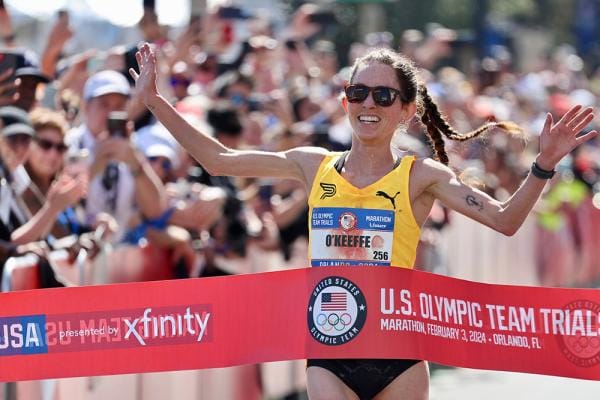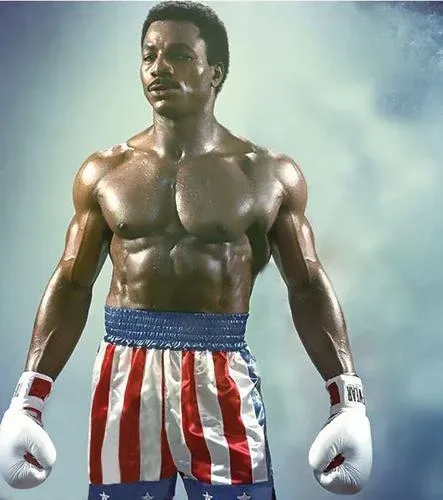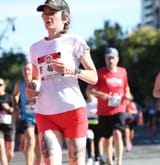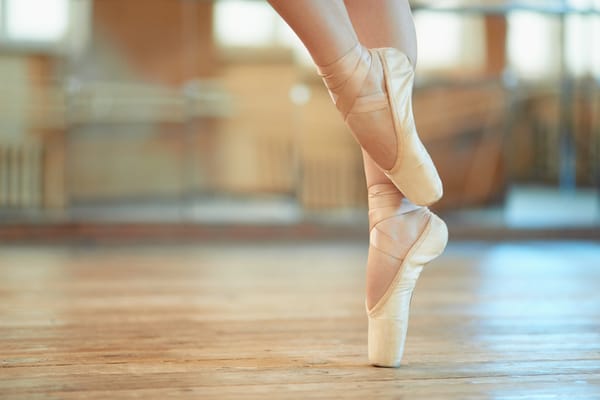Race Pace, Apple Vision Pro, and Apollo Creed

Last weekend was my first race of the year — a 10K on the same course where, back in August, I ran my first race in New York City. That race went so poorly — my worst race, and not just because I ran it slower than the half marathon I’d completed three months earlier. Even though I knew why — the heat, the humidity, the rain, the hills, the effect of moving across country on my training — it was still incredibly disappointing, and it triggered all sorts of feelings of self-doubt: maybe I wasn’t really meant to be a runner. I’ve run that course — the full loop around Central Park — many, many times now; I try to do my long runs in the park so that hopefully, someday, the hills will be less daunting. But Sunday was the first time I’d lined up to tackle it in a race again, and all that second-guessing resurfaced: “Maybe I shouldn’t race it; I’ll just treat it like a regular long run. I don’t have to PR. I probably can’t on this course. It doesn’t matter. I just have to cross the finish line.” And then the gun went off, and I ran fast and — according to Strava at least — I PR’d. It’s one of the strange things about running: so much of it is mental. You have to “trust the training,” as the cliché goes — not just feeling confident in the condition of your heart and lungs and legs, but resolute in your belief in yourself.
And my god, that was on display on Saturday at the Olympics Marathon Trials in Orlando where Fiona O’Keefe won the race in her marathon debut. That’s right — her very first marathon, having qualified for the trials with her half-marathon pace. Emily Sisson, the current American record holder, came in second. And third was Dakota Lindwurm. All three broke the record previously held by Shalane Flanagan for the fastest marathon trials time. Sisson was seen as a shoe-in, but the other two women were surprises; many of the other runners who were predicted to make the team struggled in the Florida heat and humidity — notably Keira D’Amato and Sarah Hall. (This was Hall’s eighth Olympic Trials and she has yet to make the team. Heartbreaking. And I'm sort of ride-or-die for D'Amato because I like to think we have the same running form, although hers moves her body a lot more quickly than mine.)
Also on Saturday, runner and writer Sarah Lavender Smith ran the Running Up for Air ultramarathon in Utah, and as she puts it, it wasn’t the day she’d hoped or planned for. But I just want to state publicly here that Sarah is an absolute bad-ass and an inspiration. And as we saw again and again and again this past weekend, one can be totally physically prepared and sometimes, I dunno, things just go sideways for reasons that don't seem logical or right or fair. (Racing downhill, I struggle with it too, Sarah!)
In other sports news, The Washington Post has some tips (?) on running while high. The New York Times profiles runner, coach, and author Matt Fitzgerald on how Long COVID has utterly changed his life. Elsewhere in track & field: Paralympian Erza Frech has committed to USC, the first above-the-knee amputee to commit to a Division 1 Track & Field program. (Frech is the world record holder in the high jump.) Other Olympians: Three time gold medalist Gabby Douglas has announced her return to the sport and intentions of making the 2024 Olympic team. A different sort of Olympics hopeful: Raziq Rauf interviews one of the founders of the “enhanced Olympics,” games in which you can dope all you want. Meanwhile, The Wall Street Journal on “How Iowa’s Caitlin Clark Became College Basketball’s Must-See Star.” NYC Mayor Eric Adams was thrilled to announce the 2026 World Cup will be in New York New Jersey. Christine Yu talks with Jillian Hoscock on her plans to open a womens’ sports bar in the Twin Cities.
Various updates from the ongoing fitness/wellness/health technology hustle: via The Athletic, “How years of research have evolved IDA’s soccer cleats made especially for women.” According to Wired, “this ultrasound bra could detect cancer sooner.” “Three million malware-infected smart toothbrushes used in Swiss DDoS attacks — botnet causes millions of euros in damages.” “GoFundMe Is a Health-Care Utility Now,” The Atlantic argues. According to GQ, the latest fitness trend is “overdoing your recovery.” Is this related, I wonder: Wellness programs for men are on the rise. I mean, phew! It’s about time someone thought about men’s health. “Embrace the second-dumbest fitness watch you can find,” advises Defector. NPR offers a list of VR fitness apps. Finally, a tool for tracking illness, says Techcrunch. Peloton shares fell 24% after its quarterly report gives a “dismal outlook.” The CEO blames college students. I would consider this an anti-endorsement, because anything that Andrew Huberman says to drink or eat is 100% something I am going to avoid at all cost, but bro-science gonna supplement, I guess. Folks are attaching “Ozempic” to their marketing copy throughout the fitness and wellness space, no surprise — to food and exercise alike. Fox, Disney, and Warner Brothers are launching a sports streaming service, and apparently no one told the NFL. LOL. “23andMe’s Fall From $6 Billion to Nearly $0” via The Wall Street Journal. “Can a DNA analysis help improve your fitness,” asks CNN. I mean, 23andMe really wants you to try DNA-testing – maybe this framing will work better than helping you figure out where your great-great grandmother was from. “The Apple Watch may have a calorie problem,” The Atlantic reports, having just apparently learned that calorie tracking on fitness watches is wildly inaccurate. Related: my ongoing series on heart rate monitors. Via Entrepreneur: “Meta Warns Investors That Mark Zuckerberg's Love of Extreme Sports Could Kill Him.” [Wise crack redacted.]
Last week, I promised a more thorough round-up of Apple Vision Pro reviews, but it’s been "one of those weeks" and I haven’t dived as deeply as I should. The usual suspects said sort of the usual schtick: here’s Nilay Patel’s take on the device in The Verge — “It sounds amazing, and sometimes it is.” John Gruber of Daring Fireball uses words like “revolutionary” and “breakthrough.” Techcrunch claims it’s an amazing tool for “mindfulness” — because nothing says “meditative” like wearing a $3500 device on one’s face. It “lacks polish and purpose,” according to The New York Times’ Brian X. Chen. Rob Horning has the smartest analysis I’ve read so far:
Reality goggles, regardless of whether they are perceived to work or not, support the fantasy that the individual has an autonomous, personal grasp of the real. Either they are helping you see the real in an augmented or electively virtual way, or they are reawakening an awareness of how connected to reality you are automatically, through the passive faculties of your senses. They deny that society is always already mediating reality to us in ways we can never fully fathom, let alone control.
Of course, there are already plenty of memes.
Meanwhile, the “research” says: “Your brain doesn’t want you to exercise,” says Time (drawing on the work of an evolutionary biologist so grain of salt for sure). Out there in the culture: Meredith Snell on strongwoman Pippi Longstocking. The Atlantic finally admits that what we're seeing in Silicon Valley is not "techno-optimism, but “The Rise of Techno-Authoritarianism.” And Slajov Žižek has thoughts on fitness and “proto-fascism”:
“one should radically reject the notion that discipline (from self-control to bodily training) is a »proto-Fascist« feature - the very predicate »proto-Fascist« should be abandonned: it is the exemplary case of a pseudo-concept whose function is to block conceptual analysis. When we say that the organized spectacle of thousands of bodies (or, say, the admiration of sports which demand high effort and self-control like mountain climbing) is »proto-Fascist,« we say strictly nothing, we just express a vague association which masks our ignorance. So when, three decades ago, Kung Fu films were popular (Bruce Lee etc.), was it not obvious that we were dealing with a genuine working class ideology of youngsters whose only means of success was the disciplinary training of their only possession, their bodies? Spontaneity and the »let it go« attitude of indulging in excessive freedoms belong to those who have the means to afford it – those who have nothing have only their discipline. The »bad« bodily discipline, if there is one, is not the collective training, but, rather, jogging and body-building as part of the New Age myth of the realization of the Self's inner potentials – no wonder that the obsession with one's body is an almost obligatory part of the passage of ex-Leftist radicals into the »maturity« of pragmatic politics: from Jane Fonda to Joschka Fischer, the »period of latency« between the two phases was marked by the focus on one's own body.”
One final note: “It was a pleasure just to watch Carl Weathers move.” Rest in peace, Apollo Creed.

Thanks for reading Second Breakfast. Please consider becoming a paid subscriber and supporting my writing and thinking about the future that Silicon Valley has planned for our bodies.





